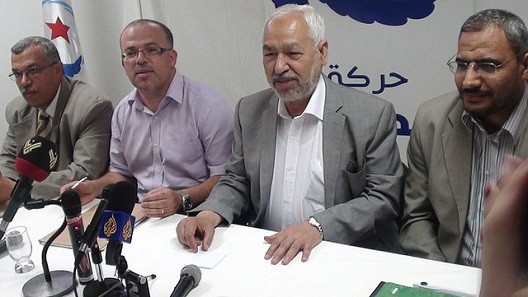
Consensus has characterized Tunisia’s transition to democracy. Ennahda, the self-styled Islamic party, governed in coalition with two secular parties. The National Dialogue, which made several important decisions about the stages of the transition, prompted Ennahda to agree to step down from power—a first for an Islamic party in the region—in favor of a technocratic government.
With the political crisis averted, the National Constituent Assembly adopted a progressive constitution in January with 92 percent voting in favor. The constitution’s overwhelming support is a testament to the arduous, two-year process of building consensus on the shape of Tunisia’s political system. The success of the system now rests in the hands of political parties that will be elected to office in the fall, and in particular, whether those parties maintain their commitment to inclusion of their opponents.
Parties will compete for leadership of a number of new democratic institutions envisioned by the constitution. Parliamentary elections are scheduled for October 24, followed by two rounds of presidential elections a month later. (There is some chance that elections will be delayed, especially in light of the elections commission’s recent extension of the deadline to register. Still, the constitution requires that elections be held before the end of the year.) Unlike under the Ben Ali regime, parliamentary elections likely will be genuine, and the parliament will have real control over the executive. The parliament will choose the prime minister, will exert nearly total control over the state budget, will be able to compel testimony from ministers, and will be able to override presidential vetoes.
The prime minister will also be much stronger under the new constitution than previously devised under Zine El Abidine Ben Ali. The prime minister will appoint and direct cabinet ministers, with the exception of the minister of defense and foreign affairs. The prime minister will be appointed by the governing coalition in parliament and not by the president. The president remains quite powerful: she or he will direct foreign and national-security policy, and will be able to call a state of emergency, to veto legislation, and to dissolve parliament under certain circumstances. The president will be the only politician elected on a single nation-wide ballot, giving him a powerful mandate vis-à-vis others in the government.
The dual executive is intended to diffuse decision-making across political actors, and the potential for conflict is high. The constitution creates a constitutional court that will, in part, reconcile debates on the prerogatives of the president and prime minister. The court will also rule on the constitutionality of laws passed to it by lower courts, or on the constitutionality of draft legislation when prompted by parliament. The constitution envisions the new court as a powerful mechanism for enforcing democracy and, as such, its membership will be balanced. The president, parliament, and Supreme Judicial Council will select four members each, four of whom will not be judges or lawyers.
In sum, the constitution creates three powerful institutions virtually from scratch: the dual executive, the parliament, and the constitutional court. The elections represent a competition between political parties for control of these institutions, with plenty of opportunity for winners and losers to work together to share in government. The potential for gridlock, however, is also high. Parties could undermine each other in implementing their programs, given the large number of veto players. Parties must commit themselves to consensus not only in assigning posts but also in executing their power.
The question is whether political parties are up to the challenge. Ennahda is the only party that has led a government, to largely negative reviews. Nidaa Tunis, which is in a dead heat with Ennahda in the polls, comprises many members of Ben Ali’s former party; the president and founder of Nidaa Tunis, Beji Caid Essebsi, was Ben Ali’s foreign minister and speaker of parliament. The Republican Party, one of the largest liberal-centrist opposition parties in the National Constituent Assembly, represents a loose coalition of parties but only holds eleven of the 217 seats. Ennahdha’s coalition partners, the Congress for the Republic and Ettakatol, are polling in the low single digits. After emerging from decades of marginalization under a one-party state, today’s parties are weak and inexperienced in governing and developing platforms. Tunisians often call for “technocratic” governments to get the country out of political crises, but at a certain point, parties with real positions will need to lead the government.
One indication of the political parties’ lack of self-confidence can be found in their negotiations over a consensus presidential candidate. Ennahda’s proposal to put forth presidential candidates that all political forces can agree upon stems as much out of fear for their own political position as a desire for a unifying figure. Knowing well that they would unlikely win the presidency on their own, Ennahda leaders appear prepared to endorse a non-Ennahda member chosen by consensus with Nidaa Tunis and other parties. While parties attempt to mitigate the unpredictability of the presidential elections through backroom negotiations, commentators are right to criticize the plan for robbing Tunisian voters the genuine choice of several qualified candidates.
Consensus will be required to make the constitution succeed, but an excess of consensus from parties too closely resembles the pre-determination of political outcomes from the Ben Ali era. Tunisian political parties must commit themselves to working together regardless of the outcome of the elections and ultimately hold themselves accountable to the people—not to each other.
Duncan Pickard is a nonresident fellow at the Rafik Hariri Center for the Middle East.
Image: Rachid Ghannouchi, head of the Islamist Ennahda party once banned in Tunisia, speaks at a press conference in June 2011. (Photo: Flickr/Magharebia)
